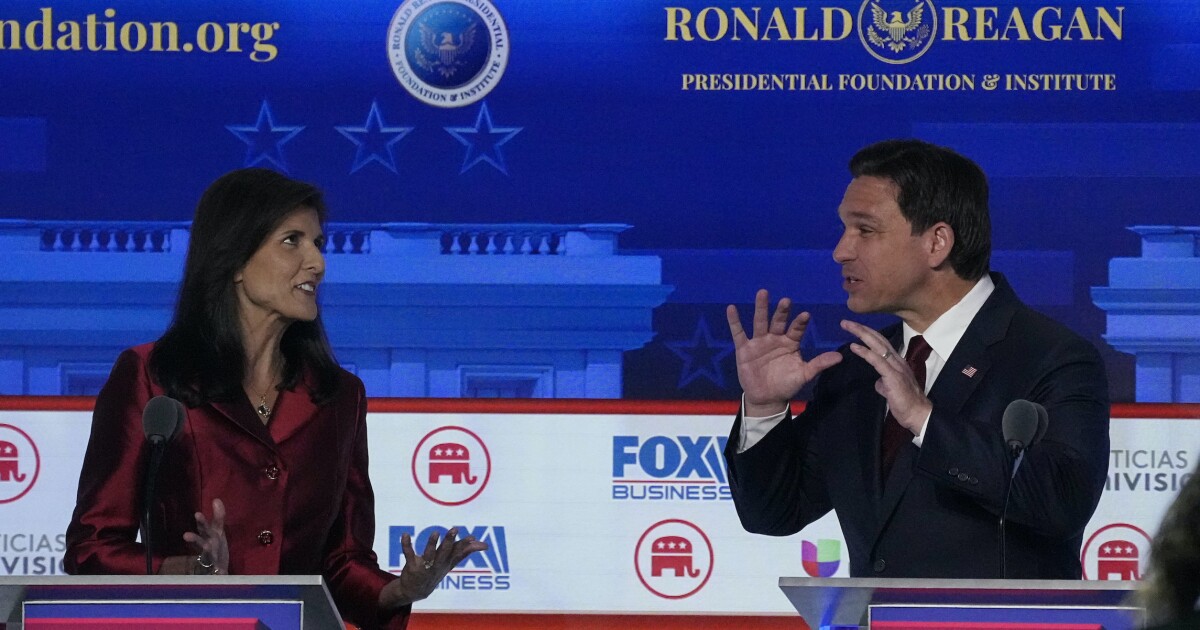

The seemingly endless battle for the House speakership isn’t the only leadership skirmish going on in the Republican Party.
Lost in the shadow of a growing number of Republicans grasping for the speaker’s gavel, and former President Donald Trump’s huge polling lead, is an increasingly intense rivalry between Gov. Ron DeSantis (R-FL) and former U.S. Ambassador to the United Nations Nikki Haley.
HOUSE GOP CONFERENCE VOTES TO ABANDON JORDAN AS SPEAKER NOMINEE
DeSantis and Haley, both vying for the 2024 Republican presidential nomination, are sparring over how best to defend Israel and keep Hamas sympathizers out of the United States.
Haley’s team is accusing the DeSantis camp of lying about her record, with phrases like “DeSperate DeSantis” and “pants on fire.” DeSantis maintains that on everything from getting trapped Americans out of Israel to vetting prospective refugees, he is the man of action.
Things have gotten uncomfortably close. After months of DeSantis being the only non-Trump game in town, Haley has been the biggest and perhaps the only enduring beneficiary of the first two GOP debates. She is now second in New Hampshire and in her home state of South Carolina, where she was governor, according to the RealClearPolitics average. Haley is also third in Iowa.
DeSantis, however, remains best positioned to capitalize on a Trump stumble in Iowa. He is running second in the polling averages. The big Des Moines Register poll that tested candidate footprint, measuring things like a willingness to consider voting for someone along with overall favorability, found him to be even closer to Trump.
Well-organized campaigns that spend a lot of time in Iowa are often rewarded by the caucuses system and are able to make up ground in the polls relatively late in the game. There are questions about Trump’s caucuses operation and whether a series of missteps, including comments about abortion and Israel, a feud with Iowa’s popular Republican governor, and snubbing some local evangelical kingmakers, could wind up costing him.
An upset in Iowa could transform the race. It might shatter Trump’s aura of inevitability and refocus the contest away from a familiar face who is dealing with some serious legal problems. The precedents would be black voters defecting in large numbers from Hillary Clinton to Barack Obama after the latter won Iowa in 2008 and the dramatic impact Joe Biden’s South Carolina win had on his seemingly moribund campaign and the 2020 Democratic primaries.
Or winning Iowa could be a blip on the radar, as it was for Mike Huckabee, Rick Santorum, and, to a lesser extent, Ted Cruz. Not since Pat Buchanan in 1996 has someone translated success with Iowa evangelicals — the populist pundit finished 3 points and one delegate behind Bob Dole — into a New Hampshire primary victory. Strong social conservatism isn’t as much of an asset in today’s Granite State, especially if a lot of independents vote in the open primary, as in Iowa.
The third alternative is that Trump wins Iowa, where he is ahead by 33 points in the RealClearPolitics average and above 50% in the last two statewide polls. That’s an outcome that could be facilitated by a DeSantis-Haley quagmire.
Haley’s path would by contrast run through New Hampshire and South Carolina, though a strong finish in Iowa surely wouldn’t hurt. Trump won both of these states in 2016. But this year, the Republican primary is the only game in town for independents, and Haley actually looks likely to make it to her home state primary, unlike fellow South Carolinian Lindsey Graham.
As is the case with DeSantis, however, Haley’s chances at the nomination rest on a lot of hypotheticals. At the moment, she looks primarily like someone who is competing with the Florida governor to be best positioned to fill the vacuum if Trump implodes or his mounting legal problems somehow take him off the board.
Otherwise, the national polls look daunting for both candidates. One by Emerson College showed Trump at 59%, roughly where he is in the RealClearPolitics average, with everyone else in the single digits, including DeSantis and Haley tied at 8% apiece.
While there is no national primary, it stands to reason that once you start leaving the early states with their cheap media markets and the opportunity to focus on one place at a time, this is what the race will probably start to look like.
CLICK HERE TO READ MORE FROM THE WASHINGTON EXAMINER
In the meantime, Haley and DeSantis are both in each other’s way, trying to get a clean shot at Trump.
They will both have to train their fire on one another first.





